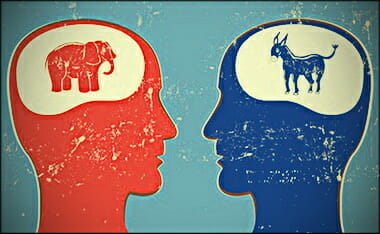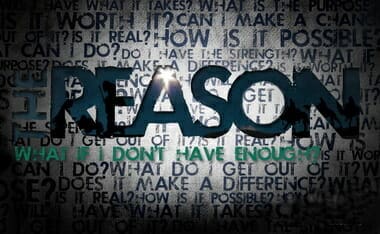When setting public policy, what’s more important: intentions or results? Feeling good or doing good? When it comes to being guided by the heart or by the mind, the Left and Right are very different.
Prager U


Dealing With Life (Left vs. Right)
The Left and Right perceive the world differently. One side sees it as it exists, accepts fundamental truths and facts–even if they are painful–and then adopts a worldview. The other side adopts a vision, and then views the world through that prism. Which side sees the world as reality? And which as it imagines?

Making Society Better (Left vs. Right)
How do you want to improve America? By focusing on improving and refining yourself? Or by transforming society? The answer to that question will reveal whether you’re on the Left or the Right.

Views on America (Left vs. Right)
Is the United States an exceptional country that has played a uniquely good role in history? Or is it a typical country, perhaps even a uniquely bad one considering the legacy of slavery and Jim Crow? On this, the Left and Right do not agree.

The World’s Most Moral Army ~ Colonel Richard Kemp
Is the Israeli military a paragon of morality and wartime ethics? Or is it an oppressive force that targets innocent Palestinian civilians and commits war crimes as a matter of policy? Colonel Richard Kemp, who was the commander of British Forces in Afghanistan, was in Israel during its war against Hamas in 2014, and analyzes whether Israel’s military is ethical, evil, or somewhere in between.

Is Climate Change Our Biggest Problem? (Bjorn Lomborg)
Is man-made climate change our biggest problem? Are the wildfires, droughts and hurricanes we see on the news an omen of even worse things to come? The United Nations and many political leaders think so and want to spend trillions of tax dollars to reverse the warming trend. Are they right? Will the enormous cost justify the gain? Economist Bjorn Lomborg, director of the Copenhagen Consensus Center, explains the key issues and reaches some sobering conclusions.
Here is a longer talk about “Prioritizing the World: How to spend $75 billion to do the Most Good”
Dr. Bjorn Lomborg is an academic and the author of the best-selling “The Skeptical Environmentalist” and “Cool It”. He challenges mainstream concerns about the environment and points out that we need to focus attention on the smartest solutions first. He is an adjunct professor at the Copenhagen Business School, and director of the Copenhagen Consensus Center, which brings together many of the world’s top economists, including seven Nobel Laureates, to set priorities for the world.

George Will On the Corruption of Campaign Finance Reform
What corrupts politics more: Millionaires and billionaires? Or the rules that intend to limit the influence of wealthy donors? George Will, author and Pulitzer Prize-winning columnist for the Washington Post, explains who designed campaign finance reform and why Congress’s solution to the problem may actually be the bigger problem.

Radical Islam: The Most Dangerous Ideology ~ Raymond Ibrahim
Is radical Islam our generation’s most dangerous ideology? Is it comparable to what Nazism and Communism were in the 20th century? Or are Islamists no more dangerous than extremist Christians, Jews, and Buddhists? Raymond Ibrahim, author of “The Al Qaeda Reader,” explains what radical Islam is, and shows how Muslims and non-Muslims alike can help defeat it.

Why the Right is Right ~ Conserving Tradition
What makes conservatism right? If you’re a conservative, you should know why you’re right. If you’re not a conservative, why should you think about becoming one? Greg Gutfeld, bestselling author of, “How To Be Right: The Art of Being Persuasively Correct”, explains. PRE-ORDER “How To Be Right“

Why We’re Losing Liberty ~ Robert George (PragerU)
Was the Constitution written in a way that was designed to protect freedom and limit the government’s size? Has it been effective in doing that? And what’s the Supreme Court’s record when it comes to protecting our rights? Robert George, Professor of Jurisprudence at Princeton University, answers these questions and more.

Do We Need Both God AND Reason? (Dennis Prager)
This really should be combined with the excellent video at Prager University, “Is Evil Rational.” Great points. Love the deeper thoughts in my ear piece as I am tooling around the warehouse at my work.
For more clear thinking like this from Dennis Prager… I invite you to visit:

Does Free Speech Offend You? (Greg Lukianoff)
Video Description:
Should offensive speech be banned? Where should we, as a society, draw the line where permitted speech is on one side, and forbidden speech is on the other? Should we even have that line? And should free speech be limited by things like trigger warnings and punishments for microaggressions? Greg Lukianoff, president of the Foundation for Individual Rights in Education, answers these questions and more.